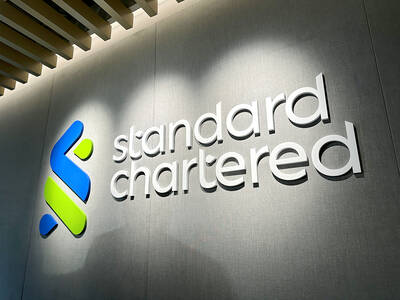Why should only the wealthy get to ride unicorns to further riches?
Privately held firms with at least US$1 billion in value come with daunting price tags that freeze out ordinary investors. Banks that help unicorns raise money are glad to chalk up a few bulky subscriptions — US$1 million and more — from top clients. It works fine with regulators who do not want the general public to lose their life savings on risky bets.
Were the ticket, say, US$1,000, even affluent millennials might want to take a punt on the next Facebook Inc or Uber Technologies Inc without having to wait for a stock market debut.

Photo: AFP
That wait is only getting longer. A sizable chunk of US$2.5 trillion of uncalled private equity — dry powder — is with venture capital funds that promising companies can use to delay going public and spread the wealth more evenly.
The “status quo” is unfair. Until its recent initial public offering (IPO), the moneyed folk who would never deign to set foot in an Airbnb Inc property could buy in, whereas a younger, regular user could not. This gap in access could also be expensive.
The “massive downward pressure on wages” that the International Labour Organization has forecast for the near term — particularly for women — could make it harder for millennials to build nest eggs if interest rates remain low for long.
However, the existing setup lacks the technology to make private securities a mass-market product.
“Private banks only show deals to clients with net worth above US$50 million,” said Oi Yee Choo, chief commercial officer of Istox, a Singapore-based digital securities platform that aims to democratize finance by fractionalizing it.
It is not the first player to do so. San Francisco-based Forge Global Inc made available unlisted shares of Spotify Technology SA, Snap Inc and Square Inc to sovereign wealth funds, family offices and wealth managers.
The Peter Thiel-backed firm is now expanding in Asia. The timing is right.
Thanks to Airbnb and DoorDash Inc, venture-backed IPOs had a banner 2020, encouraging Asian unicorns to accelerate their own listing plans. The closer the offering, the greater the retail appetite.
Blockchain might offer a way to meet this demand. Istox, a start-up that counts Singapore’s stock exchange and state investment firm among its investors, is turning securities into tokens on distributed ledgers.
These are not public and permission-less like bitcoin. Istox tokens have no value in the outside world. Nevertheless, by using them, time-consuming manual processes can be automated via smart contracts — software code that self-executes when conditions are met. A three-day settlement cycle can be shortened to seconds. Bespoke investments can be resized as tiny parcels.
Istox, which is regulated by Singapore’s monetary authority, has given people access to the world’s first digitized unicorn fund for as little as US$20,000.
After securing US$50 million in Series A funding this week from a couple of Japanese government-backed investors and others, the goal is to create an exchange that would let individuals “participate in the growth of large pre-IPO companies like Grab and TransferWise, for example,” Choo said.
The technology can handle a ticket size as low as US$500.
Grab Holdings Ltd, which began as a ride-hailing service in Southeast Asia, is now a financial services player with a Singapore digital bank license.
UK-based TransferWise has found its niche in offering cheaper international money transfers than banks. If early backers or employees of unicorns can cash out when they want, the benefit of their US$1.4 trillion market value might reach more people.
Despite the lure of red-hot equities and the appeal of day-trading platforms like Robinhood Markets Inc, the 25-to-40 age group in the US has a slightly higher exposure to cash than older cohorts. The future of work and wages is under a cloud.
If millennials’ average US$83,000 retirement account balance does not get a return boost, they would lag behind wealthier older generations.
In Asia, too, inequality is worsening in ways that would matter for both states and markets, Australia and New Zealand Banking Group Ltd (ANZ) has said.
Unemployment is soaring among Indonesia’s less-educated workers, South Korea’s part-time labor force is facing a job crunch, and India’s real wages have cratered.
To top it all, “the performance of financial assets is becoming a source of inequality,” ANZ analysts Sanjay Mathur and Dhiraj Nim said.
Before politicians reach for the hammer of taxation to tackle the inequality problem, they should use the mallet of technology.
Expectations must be realistic, though, about gains from this kind of investment democratization. Sustained 20 percent annual returns are increasingly something that only top private equity managers can boast.
In the US, the private equity industry’s 10-year performance advantage over public markets disappeared in 2019. The US-China cold war and Beijing’s scuttling of Ant Group Co’s (螞蟻集團) IPO — a reining in of “tech, trade and titans,” as Morgan Stanley puts it — might also weigh on future returns.
Singapore has not had much luck in competing with Hong Kong for hot IPOs.
However, by offering a pragmatic regulatory environment for enterprises that use blockchain — not necessarily for cryptocurrencies, but for eliminating inefficiencies in everything from remittances to trade finance and asset management — the financial center is acknowledging a simple reality: When it comes to making — or saving — money, millennials and generation Z will expect a fairer deal. They are the early adopters of tech unicorns’ products. Why should they be the last in line to get rich from businesses they have to explain to their mums and dads?
Andy Mukherjee is a Bloomberg Opinion columnist covering industrial companies and financial services. He previously was a columnist for Reuters Breakingviews. He has also worked for the Straits Times, ET NOW and Bloomberg News.
This column does not necessarily reflect the opinion of the editorial board or Bloomberg LP and its owners.

South Korea’s equity benchmark yesterday crossed a new milestone just a month after surpassing the once-unthinkable 5,000 mark as surging global memory demand powers the country’s biggest chipmakers. The KOSPI advanced as much as 2.6 percent to a record 6,123, with Samsung Electronics Co and SK Hynix Inc each gaining more than 2 percent. With the benchmark now up 45 percent this year, South Korea’s stock market capitalization has also moved past France’s, following last month’s overtaking of Germany’s. Long overlooked by foreign funds, despite being undervalued, South Korean stocks have now emerged as clear winners in the global market. The so-called “artificial intelligence

Chinese artificial intelligence (AI) start-up DeepSeek’s (深度求索) latest AI model, set to be released as soon as next week, was trained on Nvidia Corp’s most advanced AI chip, the Blackwell, a senior official of US President Donald Trump’s administration said on Monday, in what could represent a violation of US export controls. The US believes DeepSeek will remove the technical indicators that might reveal its use of American AI chips, the official said, adding that the Blackwells are likely clustered at its data center in Inner Mongolia, an autonomous region of China. The person declined to say how the US government received

FORTUNES REVERSED: The new 15 percent levies left countries with a 10 percent tariff worse off and stripped away the advantage of those with a 15 percent rate In a swift reversal of fortunes, countries that had been hardest hit by US President Donald Trump’s tariffs have emerged as the biggest winners from the US Supreme Court’s decision to strike down his emergency levies. China, India and Brazil are among those now seeing lower tariff rates for shipments to the US after the court ruled Trump’s use of the International Emergency Economic Powers Act to impose duties was illegal. While Trump subsequently announced plans for a 15 percent global rate, Bloomberg Economics said that would mean an average effective tariff rate of about 12 percent — the lowest since

Standard Chartered Bank Taiwan’s newly appointed chief executive officer, Anthony Yu (游天立), yesterday unveiled an ambitious growth strategy for the bank’s wealth management division, reflecting a bullish outlook on Taiwan’s high-net-worth market. Yu, the first local executive to lead Standard Chartered Bank’s Taiwan operations, emphasized rising client demand and detailed plans to expand the bank’s digital capabilities, as well as its physical presence across the country. Standard Chartered Taiwan saw a remarkable surge in new wealth management clients last month, with the number of clients holding assets equivalent to US$1 million more than doubling compared with the same month last year, he